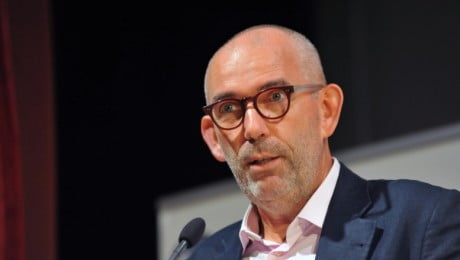Keyword: Fethullah Gulen

Arbitrary intrusions and dangerous liaisons
If the AKP leader can publicize the mistakes made during the Sledgehammer and Ergenekon trials and convince the public that these were committed by overzealous prosecutors linked to the Gülen movement, it will be easy for him to make a comparison with the corruption allegations against his government.

GYV says Gülen did not send letter to Erdoğan
“In those days [of the corruption debate], it was conveyed to us that President Abdullah Gül, having held meetings with various groups in the name of peace for the nation and to prevent debates from escalating further, wished to send an envoy to Gülen to transmit his thoughts as well as to learn Gülen’s considerations,” Şimşek explained.

Erdoğan isolates himself in power
Erdoğan is picky about journalists escorting him on board his official plane; he doesn’t like to see journalists asking annoying question around him anyway, but this time the criteria became really narrow. Umut Oran, Deputy Chairman of the main opposition Republican People’s Party (CHP) asked the prime minister about his criteria, since Erdoğan excluded most popular papers like Hürriyet, Zaman, Posta, or critical ones like Sözcü, Cumhuriyet, Radikal, and whether the travel expenses of journalists from pro-government papers would be covered on the government budget.

AK Party gov’t violates rule of law with mass profiling of civil servants
Profiling by the government — which a senior member of the ruling Justice and Development Party (AK Party) admitted to over Twitter — of some 2,000 senior public officials including police chiefs, prosecutors and judges as well as academics, journalists and business people is a violation of the constitution, analysts have said.

NPR interviews Stephen Kinzer on graft probe and Fethullah Gulen
A corruption scandal has forced Prime Minister Recep Tayyip Erdogan to reshuffle his cabinet, but he is rejecting calls for his resignation. Three of his ministers have resigned because of the scandal. The situation today is being called the biggest threat yet to Erdogan’s 11 years in office. Stephen Kinzer, visiting fellow at the Watson Institute at Brown University, joins Here & Now’s Robin Young to discuss the unfolding situation in Turkey.

A useful guide to understanding the Hizmet-AK Party tension
Mustafa Yeşil, head of the Journalists and Writers Foundation (GYV), of which Fethullah Gülen is honorary president, talks about the reasons for the increasing tension between the ruling Justice and Development Party (AK Party) government and the Hizmet movement, which conducts praiseworthy activities in Turkey and around the globe with inspiration from well-respected Turkish-Islamic scholar Gülen.

GYV calls on government to respect judiciary amid corruption probe
The government should respect Turkey’s independent judiciary as a corruption probe that has implicated senior members of the ruling party deepens, the Journalists and Writers Foundation (GYV), whose honorary chair is Turkish Islamic scholar Fethullah Gülen, said in a statement published on its website on Monday.

Why Mr. Gülen was targeted
The main difference between Islamic scholar Fethullah Gülen and the politician who became Prime Minister Recep Tayyip Erdoğan is that the former is vehemently opposed to the use and abuse of Islam as a political ideology and party philosophy while the latter sees the religion as an instrument to channel votes and to consolidate his ranks among supporters.

Turkish FM calls on Gülen Movement for dialogue to find way out political crisis
Delivering constructive messages to move away from political crisis over the graft probe, Foreign Minister Ahmet Davutoğlu has invited the Fetullah Gülen movement to engage in “dialogue and a strategic look toward the horizon.”

Three ministers resign as one urges PM to step down amid corruption probe
Environment and Urban Planning Minister Erdoğan Bayraktar, in a harsh statement, claimed that he had been pressured to submit his own resignation to save the prestige of the government, adding that the prime minister should also quit as most of the amendments on construction plans mentioned in the corruption investigation were made on Erdoğan’s orders.

What does religion have to do with corruption?
The ongoing graft investigation, which hit the press on Dec. 17 with a major police operation resulting in the arrest of 24 suspects — including prominent business figures and the sons of two ministers — sparked a public discussion on the links between politics and Islam, as a majority of the members of the ruling party present themselves as devout Muslims.





















